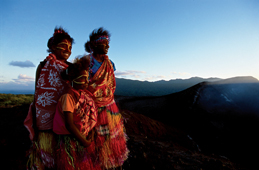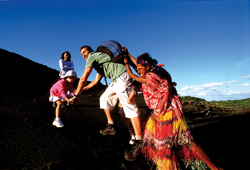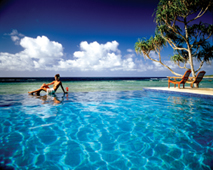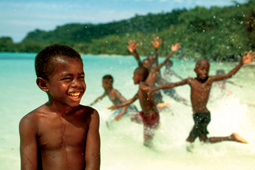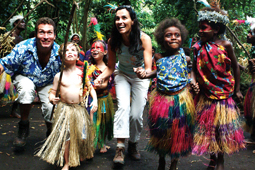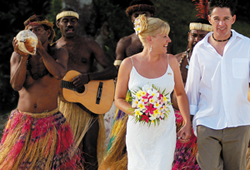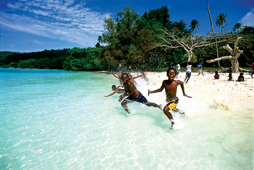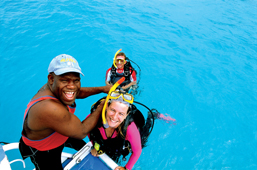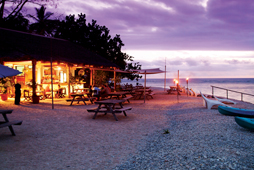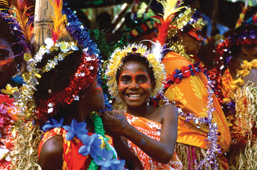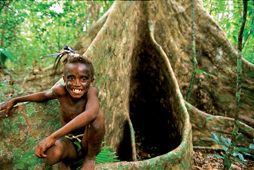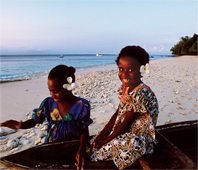
Vanuatu was ranked top twice at “Happy Planet Index” by the New Economics Foundation in 2006 & 2010.
The islands are an adventure enthusiast’s paradise and the geologically active
archipelago is a natural playground of colourful reefs, bubbling volcanoes and lush jungle. Visitors can drive up to the crater of Yasur, cited as the most accessible active volcano in the world, sea kayak round the islands’ shorelines, explore underwater WWII relics, or
hike and bike through coconut plantations and tropical rainforest.
Vanuatu was ranked top twice at “Happy Planet Index” by the New Economics Foundation in 2006 & 2010.
The islands are an adventure enthusiast’s paradise and the geologically active archipelago is a natural playground of colourful reefs, bubbling volcanoes and lush jungle. Visitors can drive up to the crater of Yasur, cited as the most accessible active volcano in the world, sea kayak round the islands’ shorelines, explore underwater WWII relics, or hike and bike through coconut plantations and tropical rainforest.
Those less inclined to exert themselves can relax on the many beautiful beaches, sample the multicultural cuisine in the capital, Port-Vila, or charter a boat from one island to the next. Tourism is centred on the islands of Efaté, Tanna and Espiritu Santo. International visitors arrive in Port-Vila, on Efaté, and from here can travel by boat or plane to explore the rest of the country.
Warm and welcoming, the local people come from over 100 villages spread across the 83 islands of the tropical archipelago. With a rich (and sometimes mysterious) traditional culture, the ni-Vanuatu people greet visitors as friends, introduce them to ‘island time’ and share their knowledge and love of the country that was officially named ‘the happiest nation on the planet’.
Vanuatu - Top 10 destinations by Lonely Planet 2011
Discover the Treasure and Beauty of Vanuatu
You’re heading to Vanuatu? Fantastic. You’re going to love it. But it’s not just a decadent escape with balmy breezes and gourmet food. It’s also home to several best-in-the-world experiences that very few people know about: a luxury liner, like the Titanic, shipwrecked in clear diveable water; the world’s most accessible active volcano on the island of Tanna; a giant banyan tree the size of a soccer field; pounding, cascading waterfalls; extraordinary cultural ceremonies and dances on the island of Malekula; primitive villages where you can witness an ancient living culture; and picture-perfect beaches where there’s nobody but you and your snorkel gear. It’s also a snorkellers’ and divers’ Mecca.
Port Vila, the national capital on the island of Efate, buzzes at the centre of Vanuatu’s tourist trade, all colonial and cool, with a view for every restaurant, and hotel beds that float you out over lagoons. If you’ve come on a package deal, you’re just starting your adventure. Stay on when it ends to discover a few of the unique things that are Vanuatu, and to try out the sporty options, like abseiling down a waterfall, parasailing over the glorious harbour, zapping out of a cave of stalactites through a ravine on a blow-up float-ring, turning nature-child for the night on a tiny offshore island.
Make the most of this South Pacific paradise with your choice of adventure tours and activities from kayaking trips, game fishing, scuba diving or sailing trips throughout the magnificant islands of Vanuatu. There’s 83 islands and adventure waiting for you to enjoy on many of them. Vanuatu is one of the few places in the world where you can stand at the rim of an active volcano – an awe-inspiring site many travel to Tanna Island to witness.
The best thing about Vanuatu, though, is that you feel safe and happy here. The people are a delight. They love their country and want you to enjoy its pleasures, but they aren’t after the ‘tourist dollar’. There’s no bargaining, no hawkers, no pressure to buy. It is so refreshing.
History
Many of the islands of Vanuatu have been inhabited for thousands of years, the oldest archaeological evidence found dating to 2000 BC. In 1605, the Portuguese explorer Pedro Fernández de Quirós became the first European to reach the islands, believing it to be part of Terra Australis. Europeans began settling the islands in the late 18th century, after British explorer James Cook visited the islands on his second voyage, and gave them the name New Hebrides.
In 1887, the islands began to be administered by a French-British naval commission. In 1906, the French and British agreed to an Anglo-French Condominium on the New Hebrides.
Location
The Republic of Vanuatu is an island nation located in the South Pacific Ocean. The archipelago is located some 1,750 km east of Australia, 500 km north-east of New Caledonia, west of Fiji and south of the Solomon Islands. It was named New Hebrides during its colonial period.
Economy
The four mainstays of the economy are agriculture, tourism, offshore financial services, and cattle raising. There is substantial fishing activity, although this industry does not bring in much foreign exchange. Exports include copra, kava, beef, cocoa, and timber, and imports include machinery and equipment, foodstuffs, and fuels. The country has no known petroleum deposits. A small light-industry sector caters to the local market. Tax revenues come mainly from import duties and a 12.5 percent VAT on goods and services
This South Pacific island economy is based primarily on small-scale agriculture, which provides a living for about two-thirds of the population. Fishing, offshore financial services, and tourism, with nearly 197,000 visitors in 2008, are other mainstays of the economy.
Culture
Vanuatu culture retains a strong diversity through local regional variations and through foreign influence. Vanuatu may be divided into three major cultural regions. With a population of approximately 221,000 (from the Vanuatu Statistics Bureau 2006), Vanuatu boasts 113 distinct languages and innumerable dialects. This makes it one of the most culturally diverse countries on earth. This amazing diversity is a result of 3,000 years of sporadic immigration from many Pacific countries
The traditional music of Vanuatu is still thriving in the rural areas of Vanuatu. Musical instruments consist mostly of idiophones: drums of various shape and size, slit gongs, as well as rattles, among others. Another musical genre that has become widely popular during the 20th century in all areas of Vanuatu, is known as string band music. It combines guitars, ukulele, and popular songs.
Cuisine
The cuisine of Vanuatu (aelan kakae) incorporates fish, root vegetables such as taro and yams, fruits, and vegetables. Most island families grow food in their gardens, and food shortages are rare. Papayas, pineapples, mangoes, plantains, and sweet potatoes are abundant through much of the year. Coconut milk and cream are used to flavor many dishes.
Education
In Port Vila, and three other centres, are locations of the University of the South Pacific, an educational institution co-owned by twelve Pacific countries. The campus in Port Vila, known as the Emalus Campus, houses the University’s law school.

